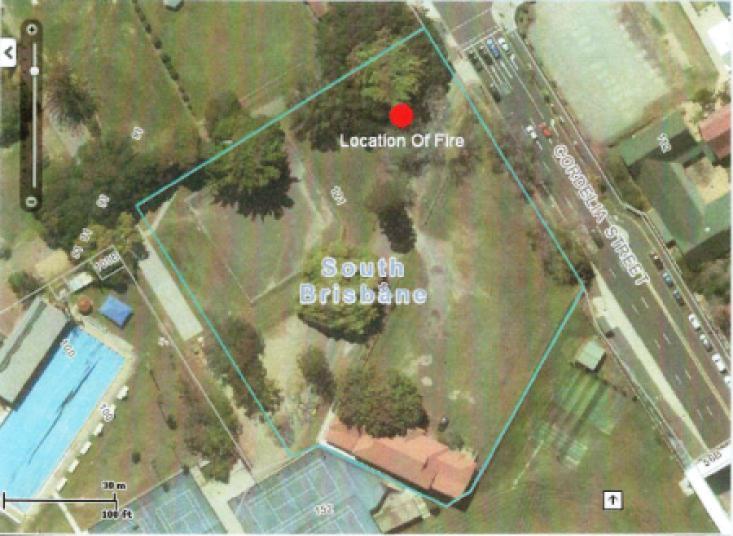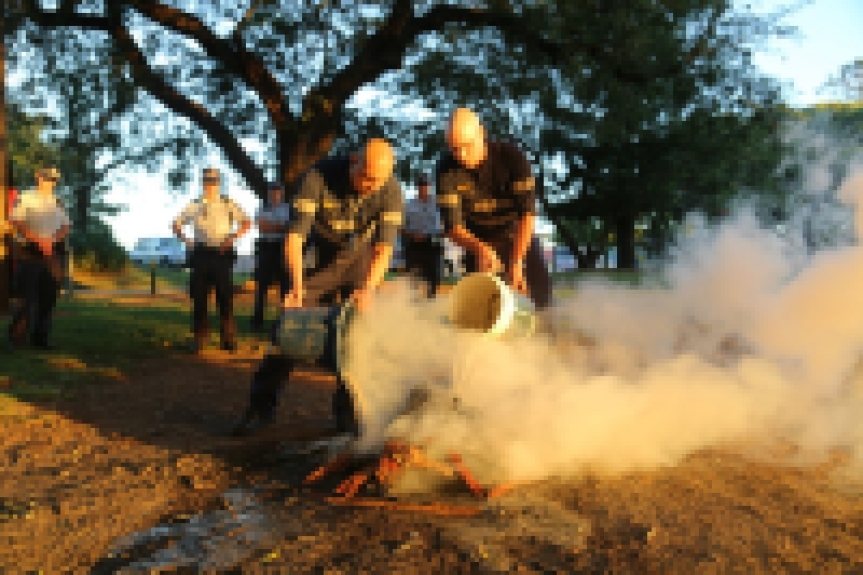Beginning in 1998 the Queensland Labor Government attempted, with the support of the Aboriginal Community, to build a cultural centre in Musgrave Park. The government set up a deed-of-grant-in-trust dedicating the land ‘for aboriginal and for no other purpose whatsoever’. The state government made the Brisbane City Council Trustee of the land under a deed-of-grant-in-trust.
Brisbane City Council began negotiations with the aboriginal community and plans were drawn up. The land was subject to Brisbane local laws including laws relating to camping, rubbish and the use of fire.
The Queensland Land Act 1994 provides for the making of model laws regarding reserves, deeds of grant in trust and roads. The Labor Government did not pass laws allowing the aboriginal community to practice cultural business in Musgrave Park. This includes the sacred fire. Similarly there are model laws for setting up Incorporated Associations. A diligent committee wishing to do this would make sure that they set up model rules that fit their organisation and not rely solely on the model rules under Schedule 4 of the Act (also passed into law in 1999 by the Labor Government). The Musgrave Park Cultural Centre Inc could have done this but did not. It chose to incorporate under a separate piece of legislation the Corporations (Aboriginal and Torres Strait Islander) Act 2006 (CATSI Act) which is administered by ORIC. Regardless, all these schemes to provide rights for the aboriginal community were set up by Labor governments but none were ever followed through.
It seems to me, then Labor governments (state and federal) acted at a superficial level because they did not make specific rules in response to the universal request from Aboriginal people that Musgrave Park be respected as a place of gathering, ceremony, commemoration and sorry business. To add insult to injury, the Aboriginal Cultural Centre was never built.
However it should be noted that then Attorney-General, Matt Foley, drew up and enacted a deed-of-grant-in-trust over the southern end of Musgrave Park (see aerial photograph) which said that this area was for ‘aboriginal and no other purpose whatsoever‘. This was backed up by s52 of the Land Act 1994 which states:
The trustee of trust land (in this case the BCC) may take all action necessary for the maintenance and management of the land. However, the action must be consistent with— the purpose for which the reserve was dedicated or the land was granted in trust…
In reply the Brisbane City Council prosecutor argued that the deed-of-grant-in-trust does not mean what it says. He quoted a high court case, Down v Attorney-General (Qld) about the competing uses of a park for different sports. The decision of the high court in Down said that a park under a deed-of-grant-in-trust for use as a cricket ground can be used for other purposes (e.g. athletics) so long as they do not interfere with the main purpose. No one disputes this so long as there is respect given to the original owners and that the primary purpose of the land is not interfered with. And this purpose was outlined by defence witnessess – both Jagara men.
The prosecutor argued that the aboriginal purpose can’t be inconsistent with the local law that says that there is a prohibition on fires (with some exceptions).

I am charged under Brisbane local law that I did ‘light and maintain a fire in the open air’ in Musgrave Park which is not a rural area. I was asked to do so by a Jagara traditional owner from the Bonner clan. The land where I lit and maintained the fire was where the Aboriginal Cultural Centre was to be built. In 1994 Nunuccal man, Bejam Dennis Walker, argued in the High Court that the common law is only valid in its application to aboriginal people to the extent to which it has been accepted by them. I am arguing that ‘aboriginal purpose’ overrides local law to the extent that aboriginal people do not accept it. In this case there was clear evidence that aboriginal people demanded that the sacred fire be maintained.
Fire for Cooking Purposes
On 18 December 2012 the Brisbane Aboriginal Sovereign Embassy called a breakfast on the Deed-of-Grant-in-Trust land. On that occasion I was cooking banana pancakes over the fire. Council Officers charged me with maintaining the fire under Health Safety and Amenity Local Law Act 2009. However lighting and maintaining a fire for cooking is permitted under local law. The BCC officers depicted in the video seemed to think that we we on a park used as a sport and recreation area. They were mistaken both in law and in fact.
Later on the same day I was charged with maintaining the fire based solely on the fact that I brought wood to Musgrave Park. This charge was also dismissed because it is not an offence under Health Safety and Amenity Local Law Act 2009 to supply wood. [Please note that collecting firewood in a park may be an offence under the new Public Land and Council Assets Local Law 2014 and this law should be defied because it restricts peoples right to assembly in parks and squares – places .]
‘Jury out’ on Sacred Fire
After two days of evidence and argument the decision on whether the lighting and maintaining of the sacred fire is lawful has been adjourned for a decision at a date to be fixed. The court heard Jagara traditional owner, Kevin Vieritz, say that:
the sacred fire is lit and maintained so that those who gathered around it can freely express themselves. The fire is used in aboriginal culture to burn away the old and to bring in the new. The fire is cleansing because when people pass through the smoke it excludes bad things and bad thoughts. The fire is communal, for cooking, sacred for telling the truth, for making marriage arrangements, the smoking for health and gathering around the fire as a family.
Another Jagara man, Sam Watson, said that the fire was important because he could recall as a young fellow a hole was dug and food was cooked in the ground in Musgrave Park. Sam Watson said that the fire is used for Sorry Business and for commemorating fallen warriors like Dundalee who was hung in Post Office square by colonial authorities for leading a resistance against the settlers.
Sam Watson also said that negotiations with government for a place to commemorate fallen warriors had stalled because Campbell Newman had reneged on his promise to provide a place in Post Office Square where a commemoration ceremony occurs each year in January.
Apparently, there was some concern among aboriginal elders about the tent embassy because of allegations of bad behaviour of juveniles in the park. The reference to a murder in the park being one reason to close down the tent embassy was incorrect because that sorry event predated the tent embassy by several years, the murder occurred in July 2008 and was the result of amphetamines, alcohol and paint sniffing.
The Brisbane Aboriginal Sovereign Embassy has been a positive influence in Musgrave Park, bringing down crime rates and enabling young people to connect with their culture. It seems to me that there is a confusion of social issues in the park and the political and cultural questions raised by the tent embassy.
Brisbane City Council played on this confusion by trying to create division in the aboriginal community and their supporters. The Lord Mayor said that there was a desire to clean up the site because of the accumulation of rubbish. A skip had been ordered to clean up the site but not delivered. At one point during the trial, the magistrate said that Lord Mayor Quirk may be guilty of an offence by allowing the sacred fire in Musgrave Park. Of course, the ladder of the law has no top and no bottom 😉
All are equal before the law said the judges in Walker v NSW. No mention was made of the high incarceration rates of aboriginal people under the existing criminal justice system. The prosecution conceded that local laws do allow for the lighting of fire under a list of exceptions. For example, fires for cooking are permitted but only with a permit from the Fire Brigade, according to the BCC.
The prosecution said that no one had applied for a permit and that no local laws had been passed for the management of this deed-of-grant-in-trust or for any other deed-of-grant-in-trust in Queensland.
Magistrate Callaghan reserved his decision on the three remaining charges to a date to be fixed.
Ian Curr
October 2014
References
s 8 Queensland Aboriginal Cultural Heritage Act 2003 … significant cultural area.
s149 Queensland Justices Act 1886
s 6 HEALTH, SAFETY AND AMENITY LOCAL LAW 2009
s 29 City of Brisbane Act 2010
s52 (role of trustee), s53 (powers under trust) and s56 (model laws) Land Act 1994
Lynch … “They give a power to lay down rules in respect of matters of municipal concern, matters that have been reasonably understood to be within the province of municipal government because they affect the welfare and good government of the city and its inhabitants. The words are not to be applied without caution nor read as if they were designed to confide to the city more than matters of local government.”




One thought on “Strange Trial of the Sacred Fire”